Language's Role in Critical Thinking: A Comprehensive Analysis
VerifiedAdded on 2023/06/08
|8
|2270
|87
Essay
AI Summary
This essay examines the effect of language on critical thinking, focusing on how language proficiency and structure influence the ability to analyze information critically. The study reviews existing literature and research, including a study involving Japanese students, to explore the relationship between language skills and critical thinking abilities. It considers the influence of cultural background, epistemic beliefs, and the challenges faced by students learning in a second language. The essay highlights the limitations of existing research and suggests further investigation into cognitive abilities and individual perceptions to enhance critical thinking methodologies. The paper concludes that language proficiency significantly impacts the adoption of knowledge, critical evaluation, and expression of thoughts, providing valuable insights for improving critical thinking skills.
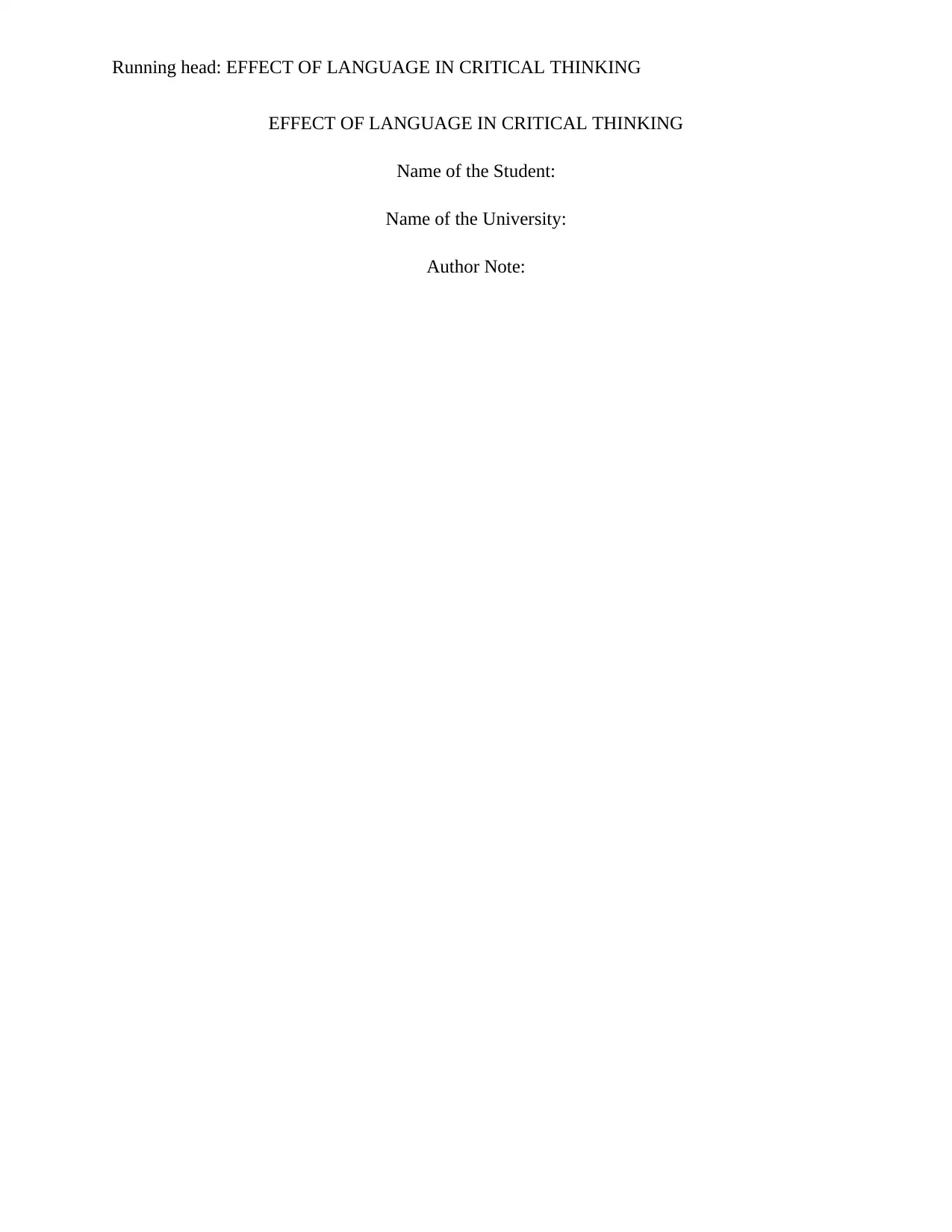
Running head: EFFECT OF LANGUAGE IN CRITICAL THINKING
EFFECT OF LANGUAGE IN CRITICAL THINKING
Name of the Student:
Name of the University:
Author Note:
EFFECT OF LANGUAGE IN CRITICAL THINKING
Name of the Student:
Name of the University:
Author Note:
Paraphrase This Document
Need a fresh take? Get an instant paraphrase of this document with our AI Paraphraser
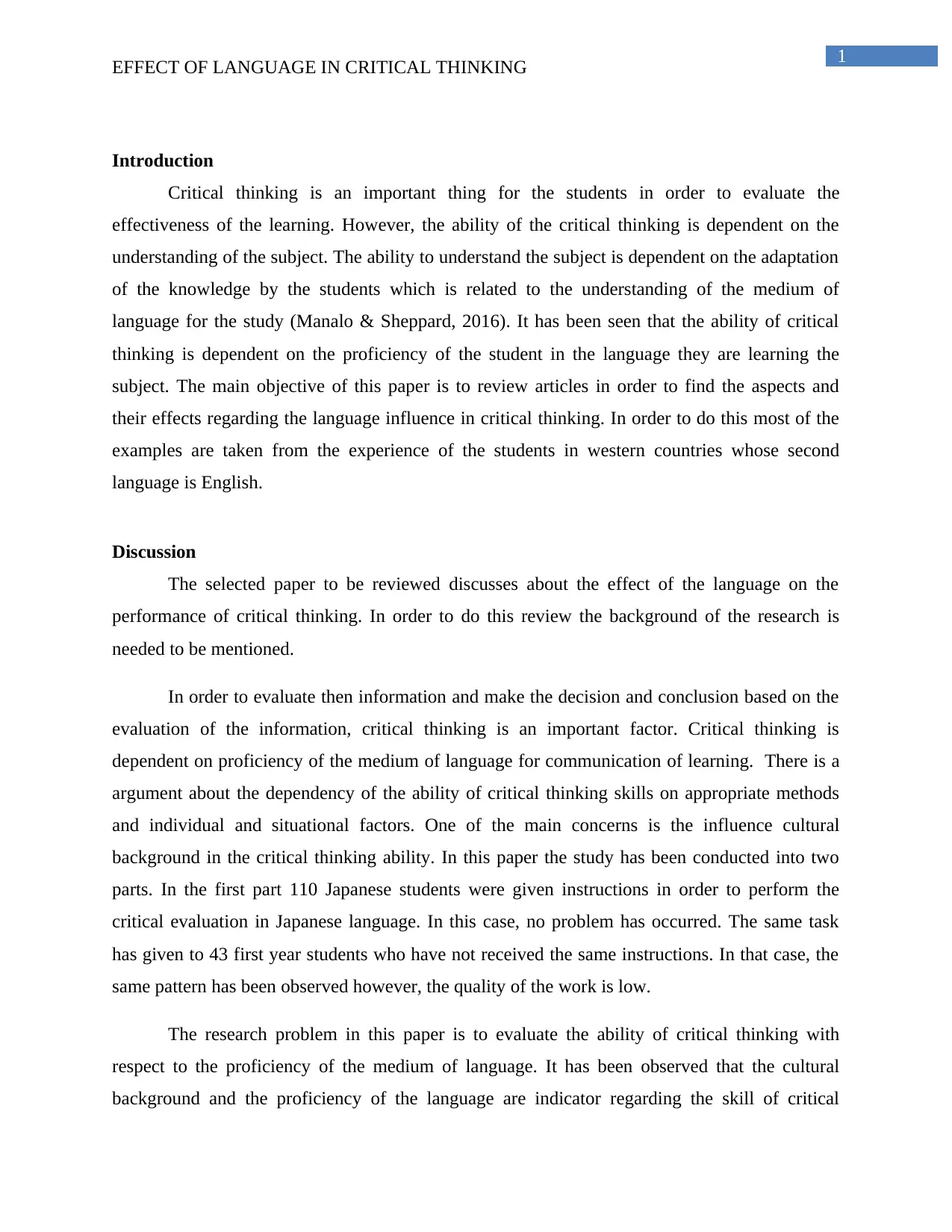
1
EFFECT OF LANGUAGE IN CRITICAL THINKING
Introduction
Critical thinking is an important thing for the students in order to evaluate the
effectiveness of the learning. However, the ability of the critical thinking is dependent on the
understanding of the subject. The ability to understand the subject is dependent on the adaptation
of the knowledge by the students which is related to the understanding of the medium of
language for the study (Manalo & Sheppard, 2016). It has been seen that the ability of critical
thinking is dependent on the proficiency of the student in the language they are learning the
subject. The main objective of this paper is to review articles in order to find the aspects and
their effects regarding the language influence in critical thinking. In order to do this most of the
examples are taken from the experience of the students in western countries whose second
language is English.
Discussion
The selected paper to be reviewed discusses about the effect of the language on the
performance of critical thinking. In order to do this review the background of the research is
needed to be mentioned.
In order to evaluate then information and make the decision and conclusion based on the
evaluation of the information, critical thinking is an important factor. Critical thinking is
dependent on proficiency of the medium of language for communication of learning. There is a
argument about the dependency of the ability of critical thinking skills on appropriate methods
and individual and situational factors. One of the main concerns is the influence cultural
background in the critical thinking ability. In this paper the study has been conducted into two
parts. In the first part 110 Japanese students were given instructions in order to perform the
critical evaluation in Japanese language. In this case, no problem has occurred. The same task
has given to 43 first year students who have not received the same instructions. In that case, the
same pattern has been observed however, the quality of the work is low.
The research problem in this paper is to evaluate the ability of critical thinking with
respect to the proficiency of the medium of language. It has been observed that the cultural
background and the proficiency of the language are indicator regarding the skill of critical
EFFECT OF LANGUAGE IN CRITICAL THINKING
Introduction
Critical thinking is an important thing for the students in order to evaluate the
effectiveness of the learning. However, the ability of the critical thinking is dependent on the
understanding of the subject. The ability to understand the subject is dependent on the adaptation
of the knowledge by the students which is related to the understanding of the medium of
language for the study (Manalo & Sheppard, 2016). It has been seen that the ability of critical
thinking is dependent on the proficiency of the student in the language they are learning the
subject. The main objective of this paper is to review articles in order to find the aspects and
their effects regarding the language influence in critical thinking. In order to do this most of the
examples are taken from the experience of the students in western countries whose second
language is English.
Discussion
The selected paper to be reviewed discusses about the effect of the language on the
performance of critical thinking. In order to do this review the background of the research is
needed to be mentioned.
In order to evaluate then information and make the decision and conclusion based on the
evaluation of the information, critical thinking is an important factor. Critical thinking is
dependent on proficiency of the medium of language for communication of learning. There is a
argument about the dependency of the ability of critical thinking skills on appropriate methods
and individual and situational factors. One of the main concerns is the influence cultural
background in the critical thinking ability. In this paper the study has been conducted into two
parts. In the first part 110 Japanese students were given instructions in order to perform the
critical evaluation in Japanese language. In this case, no problem has occurred. The same task
has given to 43 first year students who have not received the same instructions. In that case, the
same pattern has been observed however, the quality of the work is low.
The research problem in this paper is to evaluate the ability of critical thinking with
respect to the proficiency of the medium of language. It has been observed that the cultural
background and the proficiency of the language are indicator regarding the skill of critical
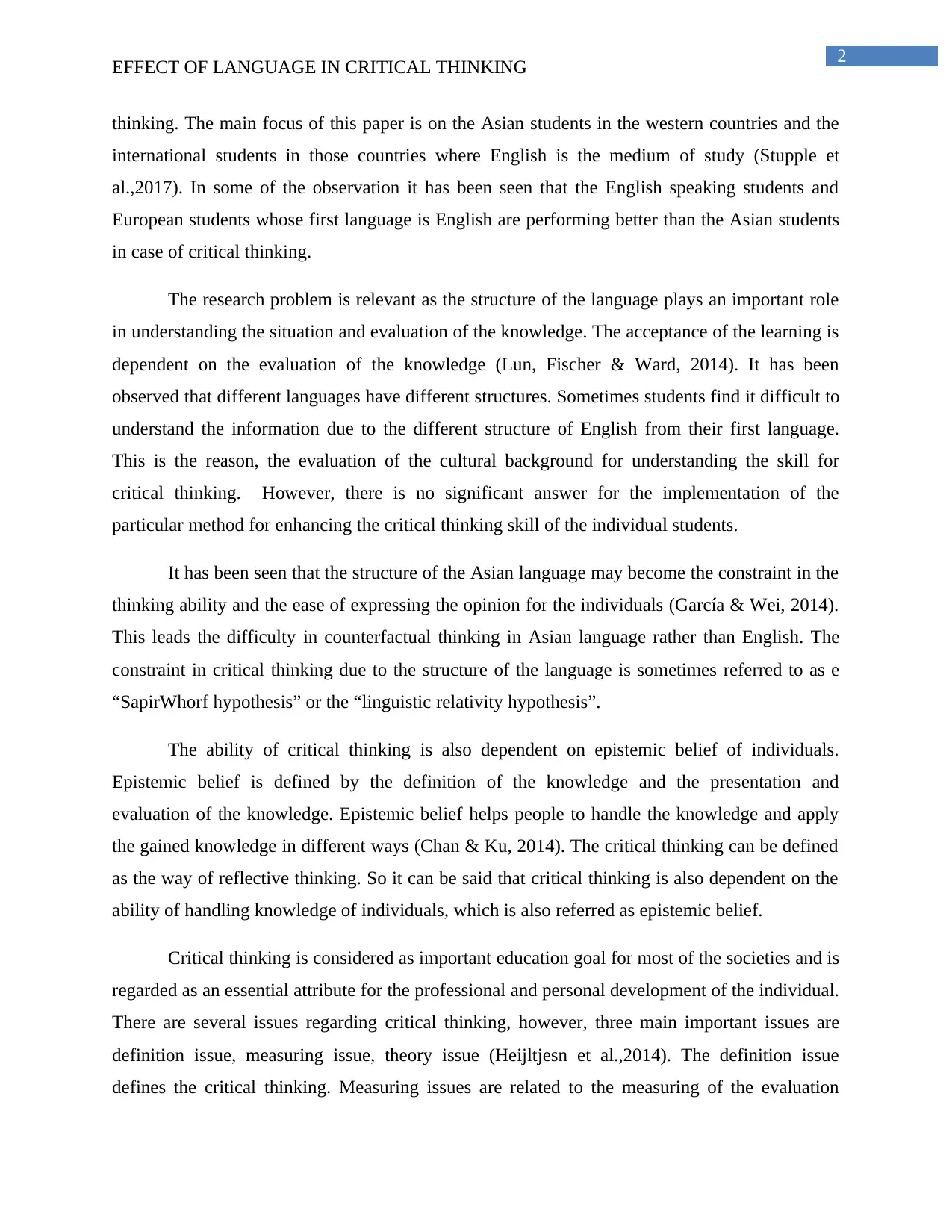
2
EFFECT OF LANGUAGE IN CRITICAL THINKING
thinking. The main focus of this paper is on the Asian students in the western countries and the
international students in those countries where English is the medium of study (Stupple et
al.,2017). In some of the observation it has been seen that the English speaking students and
European students whose first language is English are performing better than the Asian students
in case of critical thinking.
The research problem is relevant as the structure of the language plays an important role
in understanding the situation and evaluation of the knowledge. The acceptance of the learning is
dependent on the evaluation of the knowledge (Lun, Fischer & Ward, 2014). It has been
observed that different languages have different structures. Sometimes students find it difficult to
understand the information due to the different structure of English from their first language.
This is the reason, the evaluation of the cultural background for understanding the skill for
critical thinking. However, there is no significant answer for the implementation of the
particular method for enhancing the critical thinking skill of the individual students.
It has been seen that the structure of the Asian language may become the constraint in the
thinking ability and the ease of expressing the opinion for the individuals (García & Wei, 2014).
This leads the difficulty in counterfactual thinking in Asian language rather than English. The
constraint in critical thinking due to the structure of the language is sometimes referred to as e
“SapirWhorf hypothesis” or the “linguistic relativity hypothesis”.
The ability of critical thinking is also dependent on epistemic belief of individuals.
Epistemic belief is defined by the definition of the knowledge and the presentation and
evaluation of the knowledge. Epistemic belief helps people to handle the knowledge and apply
the gained knowledge in different ways (Chan & Ku, 2014). The critical thinking can be defined
as the way of reflective thinking. So it can be said that critical thinking is also dependent on the
ability of handling knowledge of individuals, which is also referred as epistemic belief.
Critical thinking is considered as important education goal for most of the societies and is
regarded as an essential attribute for the professional and personal development of the individual.
There are several issues regarding critical thinking, however, three main important issues are
definition issue, measuring issue, theory issue (Heijltjesn et al.,2014). The definition issue
defines the critical thinking. Measuring issues are related to the measuring of the evaluation
EFFECT OF LANGUAGE IN CRITICAL THINKING
thinking. The main focus of this paper is on the Asian students in the western countries and the
international students in those countries where English is the medium of study (Stupple et
al.,2017). In some of the observation it has been seen that the English speaking students and
European students whose first language is English are performing better than the Asian students
in case of critical thinking.
The research problem is relevant as the structure of the language plays an important role
in understanding the situation and evaluation of the knowledge. The acceptance of the learning is
dependent on the evaluation of the knowledge (Lun, Fischer & Ward, 2014). It has been
observed that different languages have different structures. Sometimes students find it difficult to
understand the information due to the different structure of English from their first language.
This is the reason, the evaluation of the cultural background for understanding the skill for
critical thinking. However, there is no significant answer for the implementation of the
particular method for enhancing the critical thinking skill of the individual students.
It has been seen that the structure of the Asian language may become the constraint in the
thinking ability and the ease of expressing the opinion for the individuals (García & Wei, 2014).
This leads the difficulty in counterfactual thinking in Asian language rather than English. The
constraint in critical thinking due to the structure of the language is sometimes referred to as e
“SapirWhorf hypothesis” or the “linguistic relativity hypothesis”.
The ability of critical thinking is also dependent on epistemic belief of individuals.
Epistemic belief is defined by the definition of the knowledge and the presentation and
evaluation of the knowledge. Epistemic belief helps people to handle the knowledge and apply
the gained knowledge in different ways (Chan & Ku, 2014). The critical thinking can be defined
as the way of reflective thinking. So it can be said that critical thinking is also dependent on the
ability of handling knowledge of individuals, which is also referred as epistemic belief.
Critical thinking is considered as important education goal for most of the societies and is
regarded as an essential attribute for the professional and personal development of the individual.
There are several issues regarding critical thinking, however, three main important issues are
definition issue, measuring issue, theory issue (Heijltjesn et al.,2014). The definition issue
defines the critical thinking. Measuring issues are related to the measuring of the evaluation
⊘ This is a preview!⊘
Do you want full access?
Subscribe today to unlock all pages.

Trusted by 1+ million students worldwide
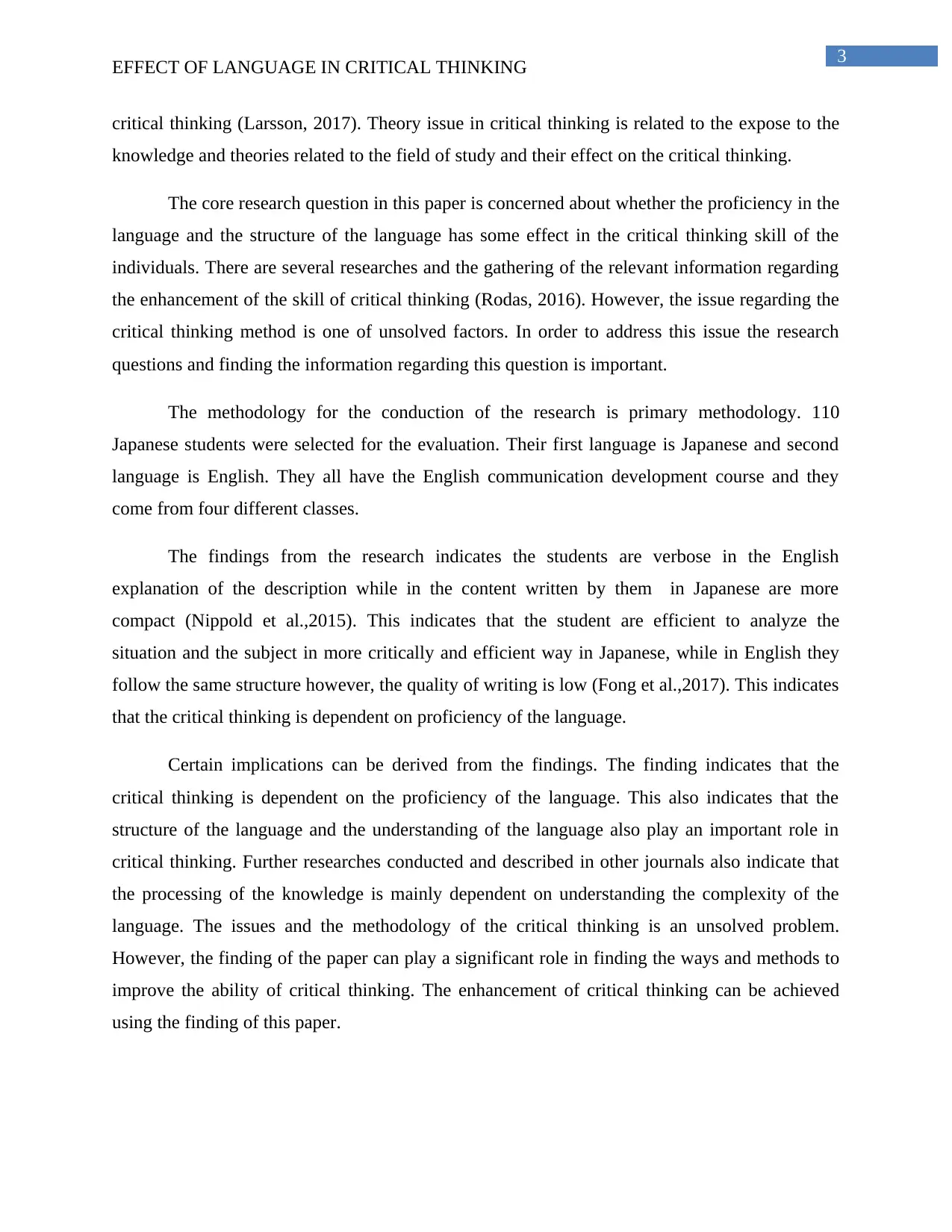
3
EFFECT OF LANGUAGE IN CRITICAL THINKING
critical thinking (Larsson, 2017). Theory issue in critical thinking is related to the expose to the
knowledge and theories related to the field of study and their effect on the critical thinking.
The core research question in this paper is concerned about whether the proficiency in the
language and the structure of the language has some effect in the critical thinking skill of the
individuals. There are several researches and the gathering of the relevant information regarding
the enhancement of the skill of critical thinking (Rodas, 2016). However, the issue regarding the
critical thinking method is one of unsolved factors. In order to address this issue the research
questions and finding the information regarding this question is important.
The methodology for the conduction of the research is primary methodology. 110
Japanese students were selected for the evaluation. Their first language is Japanese and second
language is English. They all have the English communication development course and they
come from four different classes.
The findings from the research indicates the students are verbose in the English
explanation of the description while in the content written by them in Japanese are more
compact (Nippold et al.,2015). This indicates that the student are efficient to analyze the
situation and the subject in more critically and efficient way in Japanese, while in English they
follow the same structure however, the quality of writing is low (Fong et al.,2017). This indicates
that the critical thinking is dependent on proficiency of the language.
Certain implications can be derived from the findings. The finding indicates that the
critical thinking is dependent on the proficiency of the language. This also indicates that the
structure of the language and the understanding of the language also play an important role in
critical thinking. Further researches conducted and described in other journals also indicate that
the processing of the knowledge is mainly dependent on understanding the complexity of the
language. The issues and the methodology of the critical thinking is an unsolved problem.
However, the finding of the paper can play a significant role in finding the ways and methods to
improve the ability of critical thinking. The enhancement of critical thinking can be achieved
using the finding of this paper.
EFFECT OF LANGUAGE IN CRITICAL THINKING
critical thinking (Larsson, 2017). Theory issue in critical thinking is related to the expose to the
knowledge and theories related to the field of study and their effect on the critical thinking.
The core research question in this paper is concerned about whether the proficiency in the
language and the structure of the language has some effect in the critical thinking skill of the
individuals. There are several researches and the gathering of the relevant information regarding
the enhancement of the skill of critical thinking (Rodas, 2016). However, the issue regarding the
critical thinking method is one of unsolved factors. In order to address this issue the research
questions and finding the information regarding this question is important.
The methodology for the conduction of the research is primary methodology. 110
Japanese students were selected for the evaluation. Their first language is Japanese and second
language is English. They all have the English communication development course and they
come from four different classes.
The findings from the research indicates the students are verbose in the English
explanation of the description while in the content written by them in Japanese are more
compact (Nippold et al.,2015). This indicates that the student are efficient to analyze the
situation and the subject in more critically and efficient way in Japanese, while in English they
follow the same structure however, the quality of writing is low (Fong et al.,2017). This indicates
that the critical thinking is dependent on proficiency of the language.
Certain implications can be derived from the findings. The finding indicates that the
critical thinking is dependent on the proficiency of the language. This also indicates that the
structure of the language and the understanding of the language also play an important role in
critical thinking. Further researches conducted and described in other journals also indicate that
the processing of the knowledge is mainly dependent on understanding the complexity of the
language. The issues and the methodology of the critical thinking is an unsolved problem.
However, the finding of the paper can play a significant role in finding the ways and methods to
improve the ability of critical thinking. The enhancement of critical thinking can be achieved
using the finding of this paper.
Paraphrase This Document
Need a fresh take? Get an instant paraphrase of this document with our AI Paraphraser
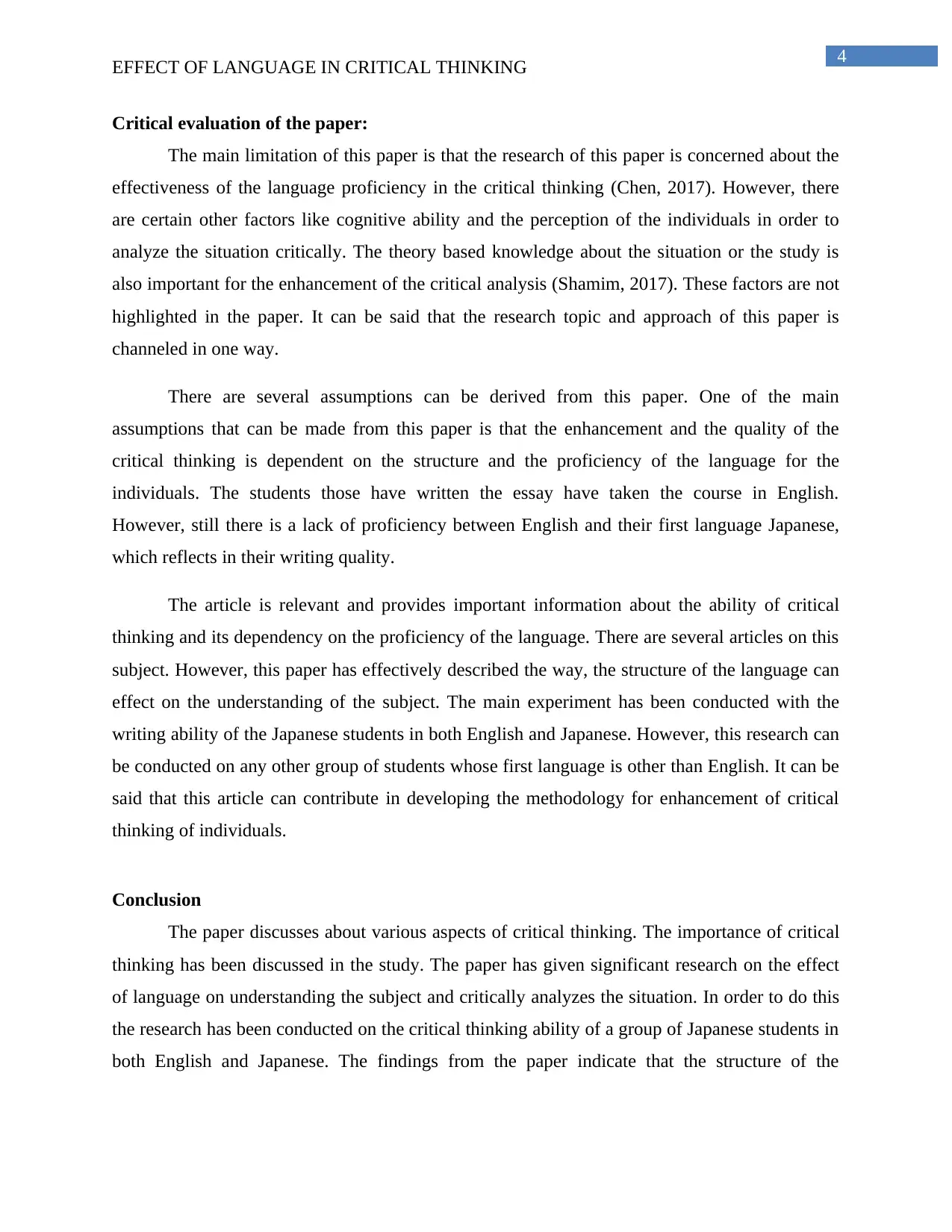
4
EFFECT OF LANGUAGE IN CRITICAL THINKING
Critical evaluation of the paper:
The main limitation of this paper is that the research of this paper is concerned about the
effectiveness of the language proficiency in the critical thinking (Chen, 2017). However, there
are certain other factors like cognitive ability and the perception of the individuals in order to
analyze the situation critically. The theory based knowledge about the situation or the study is
also important for the enhancement of the critical analysis (Shamim, 2017). These factors are not
highlighted in the paper. It can be said that the research topic and approach of this paper is
channeled in one way.
There are several assumptions can be derived from this paper. One of the main
assumptions that can be made from this paper is that the enhancement and the quality of the
critical thinking is dependent on the structure and the proficiency of the language for the
individuals. The students those have written the essay have taken the course in English.
However, still there is a lack of proficiency between English and their first language Japanese,
which reflects in their writing quality.
The article is relevant and provides important information about the ability of critical
thinking and its dependency on the proficiency of the language. There are several articles on this
subject. However, this paper has effectively described the way, the structure of the language can
effect on the understanding of the subject. The main experiment has been conducted with the
writing ability of the Japanese students in both English and Japanese. However, this research can
be conducted on any other group of students whose first language is other than English. It can be
said that this article can contribute in developing the methodology for enhancement of critical
thinking of individuals.
Conclusion
The paper discusses about various aspects of critical thinking. The importance of critical
thinking has been discussed in the study. The paper has given significant research on the effect
of language on understanding the subject and critically analyzes the situation. In order to do this
the research has been conducted on the critical thinking ability of a group of Japanese students in
both English and Japanese. The findings from the paper indicate that the structure of the
EFFECT OF LANGUAGE IN CRITICAL THINKING
Critical evaluation of the paper:
The main limitation of this paper is that the research of this paper is concerned about the
effectiveness of the language proficiency in the critical thinking (Chen, 2017). However, there
are certain other factors like cognitive ability and the perception of the individuals in order to
analyze the situation critically. The theory based knowledge about the situation or the study is
also important for the enhancement of the critical analysis (Shamim, 2017). These factors are not
highlighted in the paper. It can be said that the research topic and approach of this paper is
channeled in one way.
There are several assumptions can be derived from this paper. One of the main
assumptions that can be made from this paper is that the enhancement and the quality of the
critical thinking is dependent on the structure and the proficiency of the language for the
individuals. The students those have written the essay have taken the course in English.
However, still there is a lack of proficiency between English and their first language Japanese,
which reflects in their writing quality.
The article is relevant and provides important information about the ability of critical
thinking and its dependency on the proficiency of the language. There are several articles on this
subject. However, this paper has effectively described the way, the structure of the language can
effect on the understanding of the subject. The main experiment has been conducted with the
writing ability of the Japanese students in both English and Japanese. However, this research can
be conducted on any other group of students whose first language is other than English. It can be
said that this article can contribute in developing the methodology for enhancement of critical
thinking of individuals.
Conclusion
The paper discusses about various aspects of critical thinking. The importance of critical
thinking has been discussed in the study. The paper has given significant research on the effect
of language on understanding the subject and critically analyzes the situation. In order to do this
the research has been conducted on the critical thinking ability of a group of Japanese students in
both English and Japanese. The findings from the paper indicate that the structure of the
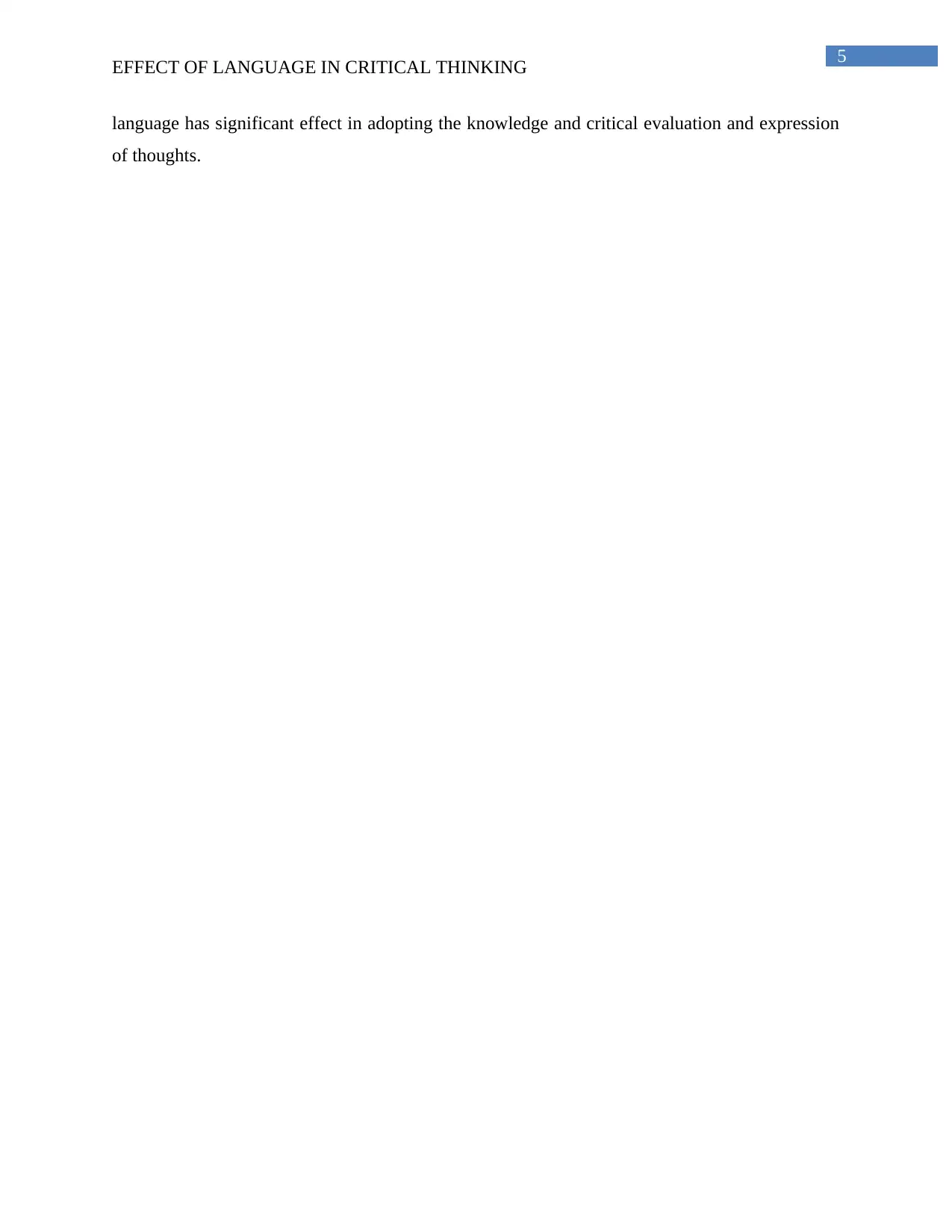
5
EFFECT OF LANGUAGE IN CRITICAL THINKING
language has significant effect in adopting the knowledge and critical evaluation and expression
of thoughts.
EFFECT OF LANGUAGE IN CRITICAL THINKING
language has significant effect in adopting the knowledge and critical evaluation and expression
of thoughts.
⊘ This is a preview!⊘
Do you want full access?
Subscribe today to unlock all pages.

Trusted by 1+ million students worldwide
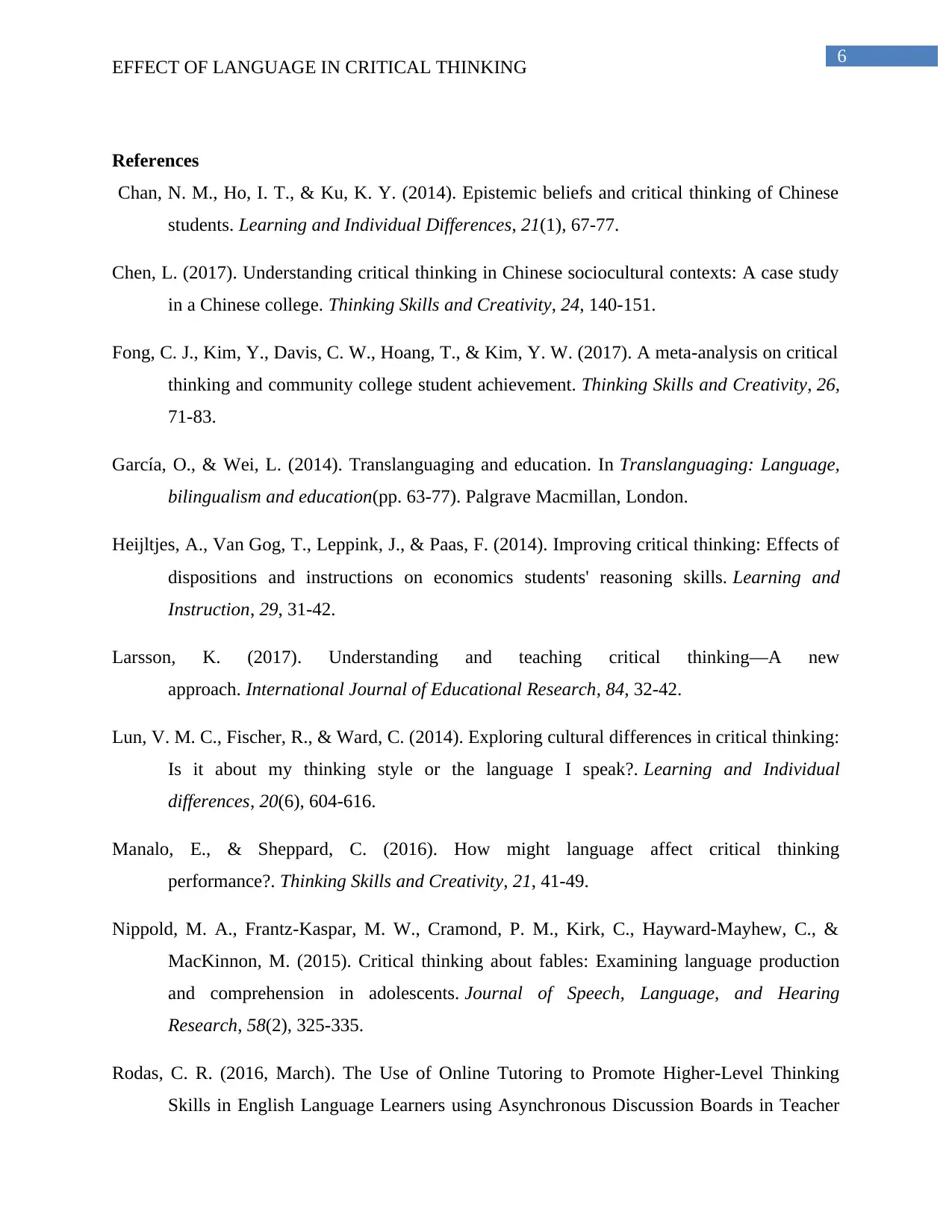
6
EFFECT OF LANGUAGE IN CRITICAL THINKING
References
Chan, N. M., Ho, I. T., & Ku, K. Y. (2014). Epistemic beliefs and critical thinking of Chinese
students. Learning and Individual Differences, 21(1), 67-77.
Chen, L. (2017). Understanding critical thinking in Chinese sociocultural contexts: A case study
in a Chinese college. Thinking Skills and Creativity, 24, 140-151.
Fong, C. J., Kim, Y., Davis, C. W., Hoang, T., & Kim, Y. W. (2017). A meta-analysis on critical
thinking and community college student achievement. Thinking Skills and Creativity, 26,
71-83.
García, O., & Wei, L. (2014). Translanguaging and education. In Translanguaging: Language,
bilingualism and education(pp. 63-77). Palgrave Macmillan, London.
Heijltjes, A., Van Gog, T., Leppink, J., & Paas, F. (2014). Improving critical thinking: Effects of
dispositions and instructions on economics students' reasoning skills. Learning and
Instruction, 29, 31-42.
Larsson, K. (2017). Understanding and teaching critical thinking—A new
approach. International Journal of Educational Research, 84, 32-42.
Lun, V. M. C., Fischer, R., & Ward, C. (2014). Exploring cultural differences in critical thinking:
Is it about my thinking style or the language I speak?. Learning and Individual
differences, 20(6), 604-616.
Manalo, E., & Sheppard, C. (2016). How might language affect critical thinking
performance?. Thinking Skills and Creativity, 21, 41-49.
Nippold, M. A., Frantz-Kaspar, M. W., Cramond, P. M., Kirk, C., Hayward-Mayhew, C., &
MacKinnon, M. (2015). Critical thinking about fables: Examining language production
and comprehension in adolescents. Journal of Speech, Language, and Hearing
Research, 58(2), 325-335.
Rodas, C. R. (2016, March). The Use of Online Tutoring to Promote Higher-Level Thinking
Skills in English Language Learners using Asynchronous Discussion Boards in Teacher
EFFECT OF LANGUAGE IN CRITICAL THINKING
References
Chan, N. M., Ho, I. T., & Ku, K. Y. (2014). Epistemic beliefs and critical thinking of Chinese
students. Learning and Individual Differences, 21(1), 67-77.
Chen, L. (2017). Understanding critical thinking in Chinese sociocultural contexts: A case study
in a Chinese college. Thinking Skills and Creativity, 24, 140-151.
Fong, C. J., Kim, Y., Davis, C. W., Hoang, T., & Kim, Y. W. (2017). A meta-analysis on critical
thinking and community college student achievement. Thinking Skills and Creativity, 26,
71-83.
García, O., & Wei, L. (2014). Translanguaging and education. In Translanguaging: Language,
bilingualism and education(pp. 63-77). Palgrave Macmillan, London.
Heijltjes, A., Van Gog, T., Leppink, J., & Paas, F. (2014). Improving critical thinking: Effects of
dispositions and instructions on economics students' reasoning skills. Learning and
Instruction, 29, 31-42.
Larsson, K. (2017). Understanding and teaching critical thinking—A new
approach. International Journal of Educational Research, 84, 32-42.
Lun, V. M. C., Fischer, R., & Ward, C. (2014). Exploring cultural differences in critical thinking:
Is it about my thinking style or the language I speak?. Learning and Individual
differences, 20(6), 604-616.
Manalo, E., & Sheppard, C. (2016). How might language affect critical thinking
performance?. Thinking Skills and Creativity, 21, 41-49.
Nippold, M. A., Frantz-Kaspar, M. W., Cramond, P. M., Kirk, C., Hayward-Mayhew, C., &
MacKinnon, M. (2015). Critical thinking about fables: Examining language production
and comprehension in adolescents. Journal of Speech, Language, and Hearing
Research, 58(2), 325-335.
Rodas, C. R. (2016, March). The Use of Online Tutoring to Promote Higher-Level Thinking
Skills in English Language Learners using Asynchronous Discussion Boards in Teacher
Paraphrase This Document
Need a fresh take? Get an instant paraphrase of this document with our AI Paraphraser
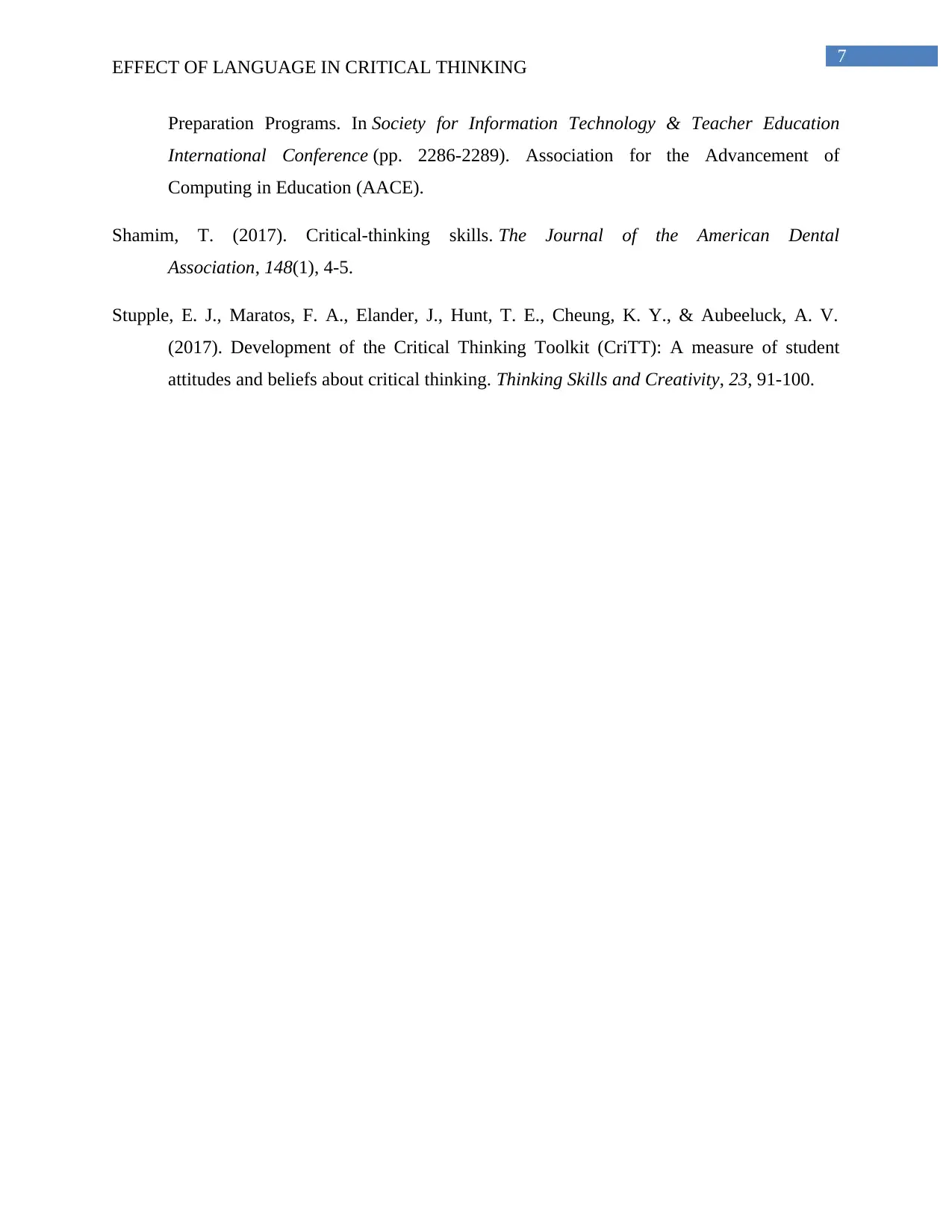
7
EFFECT OF LANGUAGE IN CRITICAL THINKING
Preparation Programs. In Society for Information Technology & Teacher Education
International Conference (pp. 2286-2289). Association for the Advancement of
Computing in Education (AACE).
Shamim, T. (2017). Critical-thinking skills. The Journal of the American Dental
Association, 148(1), 4-5.
Stupple, E. J., Maratos, F. A., Elander, J., Hunt, T. E., Cheung, K. Y., & Aubeeluck, A. V.
(2017). Development of the Critical Thinking Toolkit (CriTT): A measure of student
attitudes and beliefs about critical thinking. Thinking Skills and Creativity, 23, 91-100.
EFFECT OF LANGUAGE IN CRITICAL THINKING
Preparation Programs. In Society for Information Technology & Teacher Education
International Conference (pp. 2286-2289). Association for the Advancement of
Computing in Education (AACE).
Shamim, T. (2017). Critical-thinking skills. The Journal of the American Dental
Association, 148(1), 4-5.
Stupple, E. J., Maratos, F. A., Elander, J., Hunt, T. E., Cheung, K. Y., & Aubeeluck, A. V.
(2017). Development of the Critical Thinking Toolkit (CriTT): A measure of student
attitudes and beliefs about critical thinking. Thinking Skills and Creativity, 23, 91-100.
1 out of 8
Related Documents
Your All-in-One AI-Powered Toolkit for Academic Success.
+13062052269
info@desklib.com
Available 24*7 on WhatsApp / Email
![[object Object]](/_next/static/media/star-bottom.7253800d.svg)
Unlock your academic potential
Copyright © 2020–2026 A2Z Services. All Rights Reserved. Developed and managed by ZUCOL.


